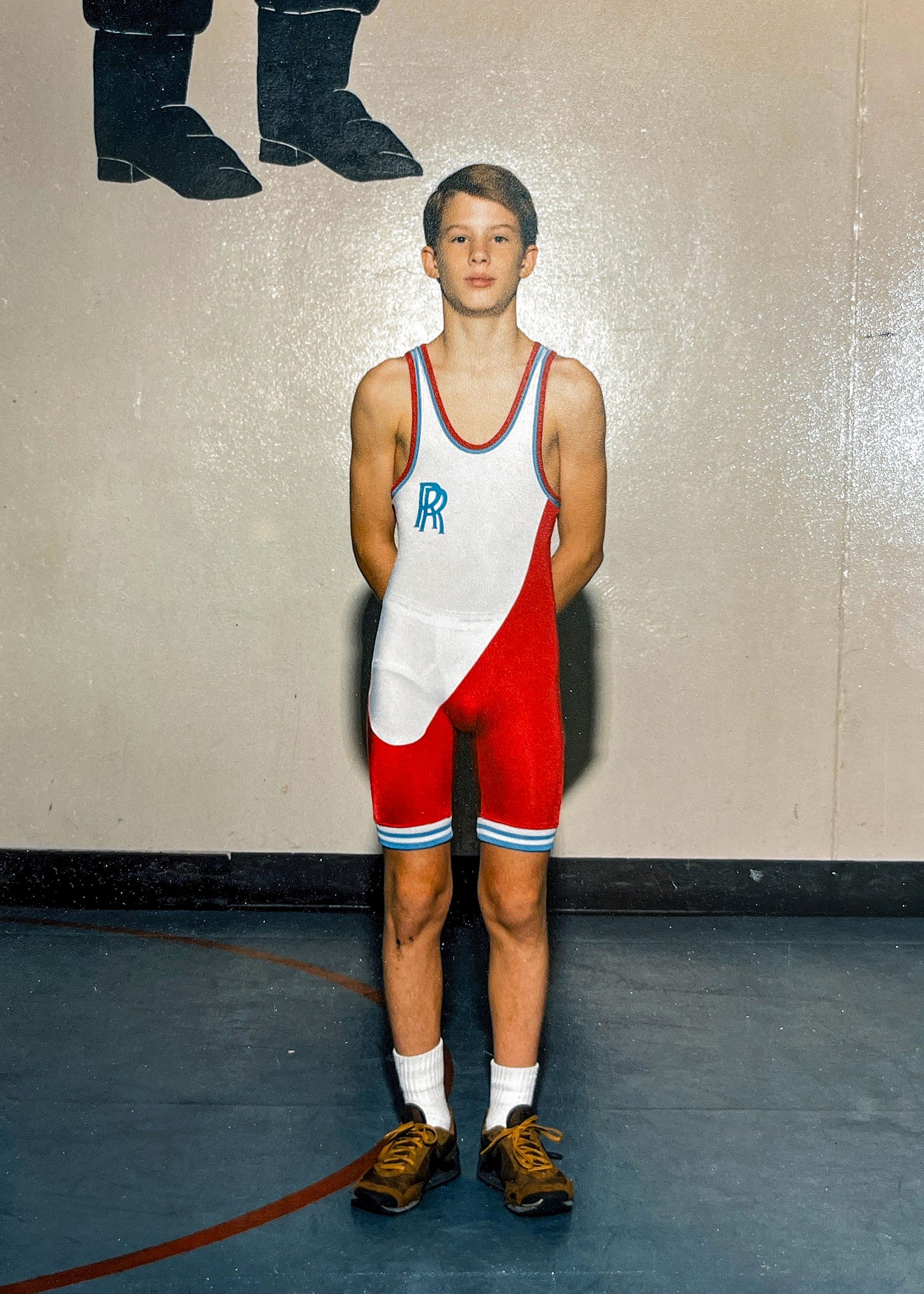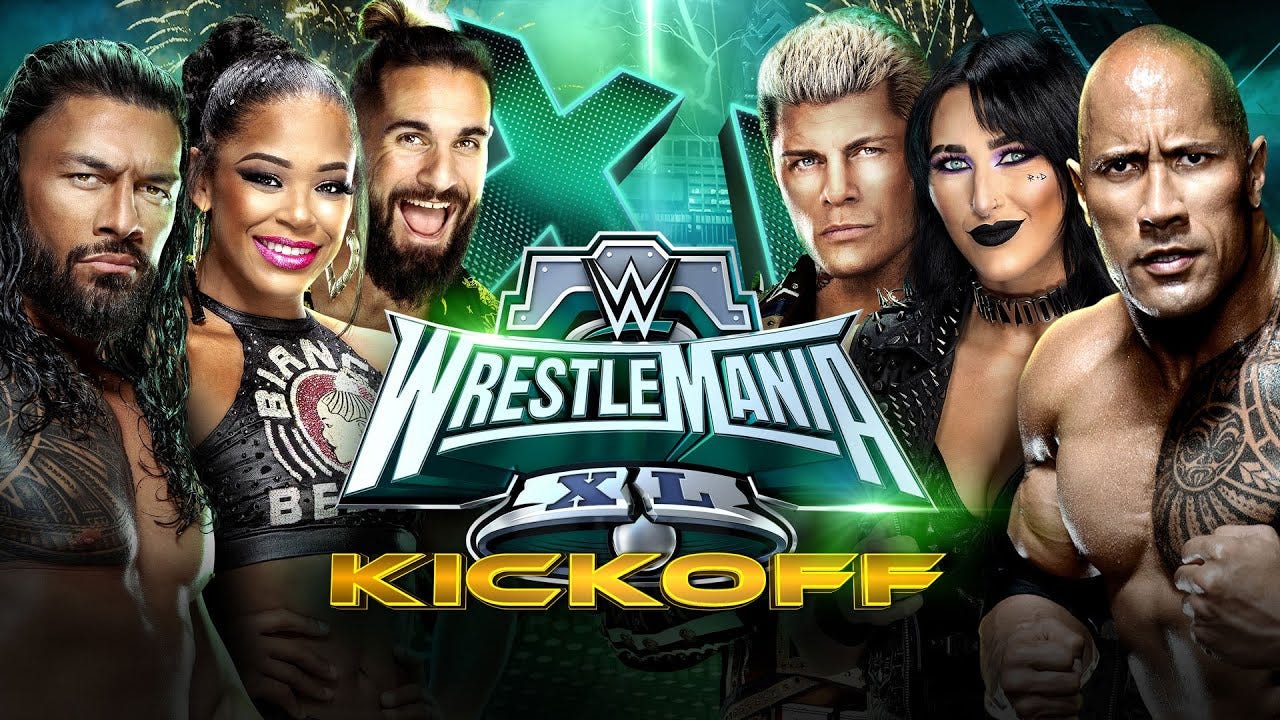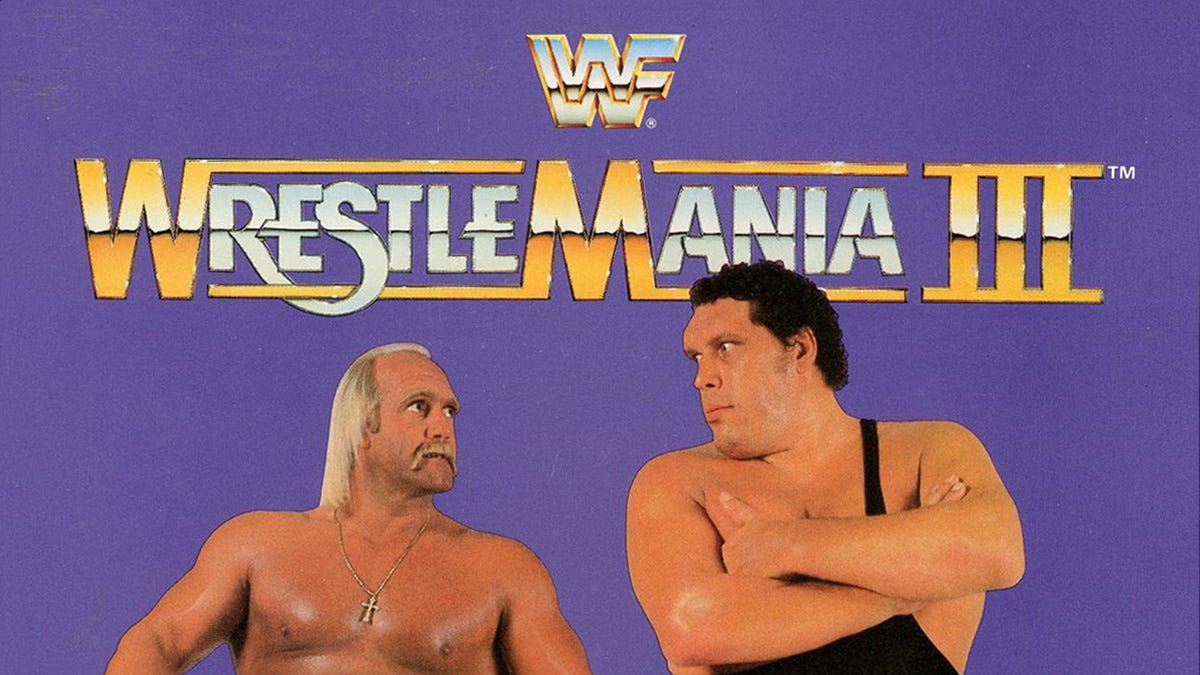I Spent 10 Hours Watching WWE WrestleMania With My Son. It Was Unbelievable.
For two days, we watched half-naked men smack each other with folding chairs and spit water in each other’s faces… because I’m a good dad.
Last weekend, I signed up for a paid Peacock subscription when my 11-year-old son begged me to so we could watch WWE’s 40th Anniversary “WrestleMania” event together.
It was the wildest, most overwhelming, most overstimulating thing I’ve ever done from the comfort of my living room.
The whole thing was an overblown visual spectacle and sonic assault, with chanting, jeering, and boos from the audience, while over-dressed men in fancy suits narrated every move using nothing but hyperbole for six hours on Saturday and four hours on Sunday.
My youngest son has always been a fan of highly energetic athletics, especially sports related to fighting, like boxing. But over the past year or two, he’s become obsessed with WWE, or, more generically, “pro wrestling.”
This has been very strange for me as his father for many reasons.
For one thing, I was born in 1985, so when I was my son’s age, the biggest names in pro wrestling were “Stone Cold” Steve Austin, Randy “Macho Man” Savage, Chris Jericho, Hulk Hogan, and Dwayne “The Rock” Johnson.
Today, when he talks about pro wrestling, he mentions names like Cody Rhodes, Roman Reigns, and Seth “Freaking” Rollins, none of whom I’ve ever heard of and who don’t seem that intimidating or scary at all.
Seriously, these guys aren’t even that big, strong, or heavy anymore. Unlike the monsters from the 1980s and 1990s (like Andre the Giant and Hulk Hogan), Cody Rhodes looks like he could be the father of any of the boys on my son’s basketball team.
Aside from his triangular American flag neck tattoo, if he were fully clothed, he could easily pass as the kind of guy I’d talk to at the end of a game and say, “Hey, man, can you take Austin with you in the carpool next time?”
For another thing, every time my son says “WWE,” it confuses the heck out of me. When I was his age, WWE (World Wrestling Entertainment) was called WWF (the World Wrestling Federation). It was until they were sued by the original WWF (the World Wildlife Fund) and had to change their name.
But that was in 2002, when I was 17. By then, I had long outgrown being in any social circles where boys were willing to admit they had ever had any interest in pro wrestling.
Also, when I was growing up, pro wrestling wasn’t dominated by one giant national conglomerate. Until Vince McMahon inherited his family’s business empire and consolidated the many wrestling leagues across the country, there were many smaller clubs and groups all over the USA.
This was still the case when I was younger, and I remember multiple leagues and brands, including WCW (World Championship Wrestling) and NWA (National Wrestling Alliance), not to be confused with the similarly named nWo (New World Order), which was a different group that featured Hulk Hogan during the weirdest turn of his career when he renamed himself “Hollywood” Hulk Hogan for a few years.
Finally, it’s also weird because I have always hated pro wrestling.
I still can’t even call it wrestling. I often use scare quotes because pro “wrestling” is not wrestling at all. It’s nothing even close to wrestling.
Not only did I hate pro wrestling throughout my life, but more than that, I hated the people who liked pro wrestling. They seemed uncouth, uncultured, and lame. Usually, they were fat. Often, they were also bullies.
One mean boy I remember from my middle school years, Wade, wore tee shirts with acronyms like WWF, nWo, and “RAW IS WAR,” which I could never make sense of but it all had to do with pro “wrestling.”
Wade was the personification of everything I didn’t like: he smelled like cigarette smoke, probably because his parents smoked. He was a mean jerk. He would frequently spit on the ground. He was fond of telling people, “You’re an idiot,” “That’s stupid,” or “I hate this or that.” And he often told people to “shut the f*ck up.”
I hated Wade. And I hated pro wrestling. I hated what they both stood for. They stood for fake machismo, and daytime television watched by non-athletic boys who may have weighed the same as their heroes on TV but didn’t have the muscle.
Seriously, everything about pro wrestling is wrong. I know: I was an actual wrestler.
I did real wrestling.
I don’t know why I even need to say this: it’s all so obvious.
Pro wrestling is a fake sport put on by fake athletes who do fake moves, who fake getting hurt, who use fake names, and who have fake backstories. There are no rules; it’s all about pretending to hurt the other guy, and no points are awarded.
Real wrestling, in contrast, is a real sport. It’s one of the oldest sports known to man (we have extensive records of organized wrestling matches going at least as far back as 1,000 B.C.).
Real wrestling has lots of rules: it’s all about getting points, it’s timed, and you’d be immediately disqualified if you used an illegal hold or exhibited unsportsmanlike conduct.
Aside from ignoring the basics of real wrestling, pro wrestlers can’t even get the first thing right: they do their thing in a boxing ring, not on a wrestling mat. This is super weird.
So, having said all that… how did I find myself spending an entire weekend watching all of this pointless drivel I can’t stand, here and now, as an adult man in 2024?
Like I said, I love my son. That’s why.
So, despite my misgivings, for the first time in my life, I not only watched the very first pro wrestling event I’ve ever seen; I watched the whole thing over the span of two days. Here are some of my biggest takeaways from this big event.
We’ve come a long, long way since the days of Macho Man and Hulk Hogan.
Although it used to be an extremely nerdy and dare-I-say-trashy activity only for overweight boys without girlfriends who had mullets or rat-tails (like Wade), pro wrestling has now become an egalitarian “there’s something for everyone” kind of event in a truly remarkable way.
There are LOTS of women in this sport now. Women who actually do the “wrestling,” too, in addition to being managers or announcers.
There were a few women in pro wrestling in years past: I recall Miss Elizabeth being a big part of the Macho Man/Hulk Hogan manufactured drama and rivalry in the 1990s. But the fact that I can even remember her name is notable: today, far too many women are involved for any one or two to stand out. That’s interesting.
Also, there is a magically perfect racial mix now: “All the faiths are represented.”
No longer does pro wrestling only feature overly spray-tanned white dudes. These days, there are black people, white people, Hispanic people, Pacific Islanders, men, women, etc.
There was even a part of WrestleMania where Hispanic commentators spoke directly to the camera—in Spanish—to ensure full representation.
Of course, this isn’t a criticism; it's just an observation. This is definitely different than it used to be.
I must say, though, while some people may cheer for changes like these, I will never get used to seeing women fight. It’s very unnatural and unnerving.
Seeing ridiculously feminine women in revealing spandex outfits and covered in gobs of pancake makeup kick, punch, and grab each other by the crotch, then throw each other on the ground and head stomp them was… jarring, to say the least.
The terminology used is very intentional.
I listened to Paul “Triple H” Levesque talk a lot during WrestleMania XL (since he did a lot of talking), and I observed for the first time ever that the phrases they use in pro wrestling are very specific and intentional. I never noticed this before.
He used words like “entertainment” and “performer.” He never used words like “athletes,” “wrestling,” or “sports.” That was intentional.
He didn’t even say “fighting,” as far as I can recall.
Even the term “WrestleMania” is carefully chosen. And I’d have to admit, it is, indeed, accurate: WrestleMania is not a match or a bout; it is, simply, “mania.”
Even Triple H himself has the title “Chief Content Officer” of WWE: not anything even remotely close to “Athletic Director” – because, at the risk of beating a dead Hogan, WWE is not about athleticism; it’s about content.
IT’S ALL ABOUT CONTENT.
WWE has branded itself as an entertainment company that cranks out content on a regular basis. And they’re pretty good at that.
It’s all about the story, even if the story isn’t plausible at all. The wrestling in “WrestleMania” comes secondary (or maybe tertiary) to the story. It’s all about content first.
Video clips, photographs, costumes, lore, concessions, merchandise, tickets, live music, pyrotechnics, and more.
Actually, the wrestling itself is the least important part of WrestleMania.
The employees are very, very polished.
Also, on another it-was-so-obvious-you-missed-it note, we didn’t hear any profanity. Surely, the wrestlers themselves use profanity. Just by lip reading when the cameras got close, we could clearly see multiple instances of them dropping the F-bomb.
But since they weren’t using a microphone, we didn’t hear it.
And all the men who were providing commentary, throughout the entire 10 hours of audio that I heard, never used any profanity at all that I could recall.
I appreciated this. It makes it less awkward to sit next to my 11-year-old and watch the whole affair without having to cringe at constant swearing. Although, to be honest, a father telling himself: “Hey, at least they’re not swearing!” is hardly a ringing endorsement of a show where a man is literally kicking another man on the ground in the face or slamming his body onto a folding table so hard it breaks in two.
On a somewhat lighter note, I counted very few “umms and ahs,” as we used to say in Toastmasters. It’s obvious that everybody who was hooked up to a microphone and had the privilege of being shown on camera has gone through extensive training and rehearsal.
The very first thing we saw prepared me for this. The televised event began with an extremely well-rehearsed and highly edited prerecorded interview with Triple H. It was a model of professionalism, public relations, public speaking, and even improvisation.
Make no mistake: I am not making fun of the folks at WWE here—they are trained well. These guys are very slick. They obviously practice, practice, practice, and practice again. Everything is highly polished.
Everything about WWE is fake. It’s so completely fake; it’s even faker than you know. It’s the fakest thing in the history of faking.
I know that fans of pro wrestling hate it when you say, “pro wrestling is fake.” They are technically correct in pointing out that it takes a lot of hard work in the gym to sculpt a body into the shape that you see for its biggest stars. (Of course, they also never mention the anabolic steroids it takes to achieve that level of camera-flattering physique.)
But even that aside, in the ten hours I spent watching WrestleMania, I was just overwhelmed by how fake everything was.
Everything… was… faked.
All the dialogue was clearly fake and scripted.
All the outcomes were clearly fake and scripted.
All the questions were clearly fake and scripted.
All the answers to the questions were clearly fake and scripted.
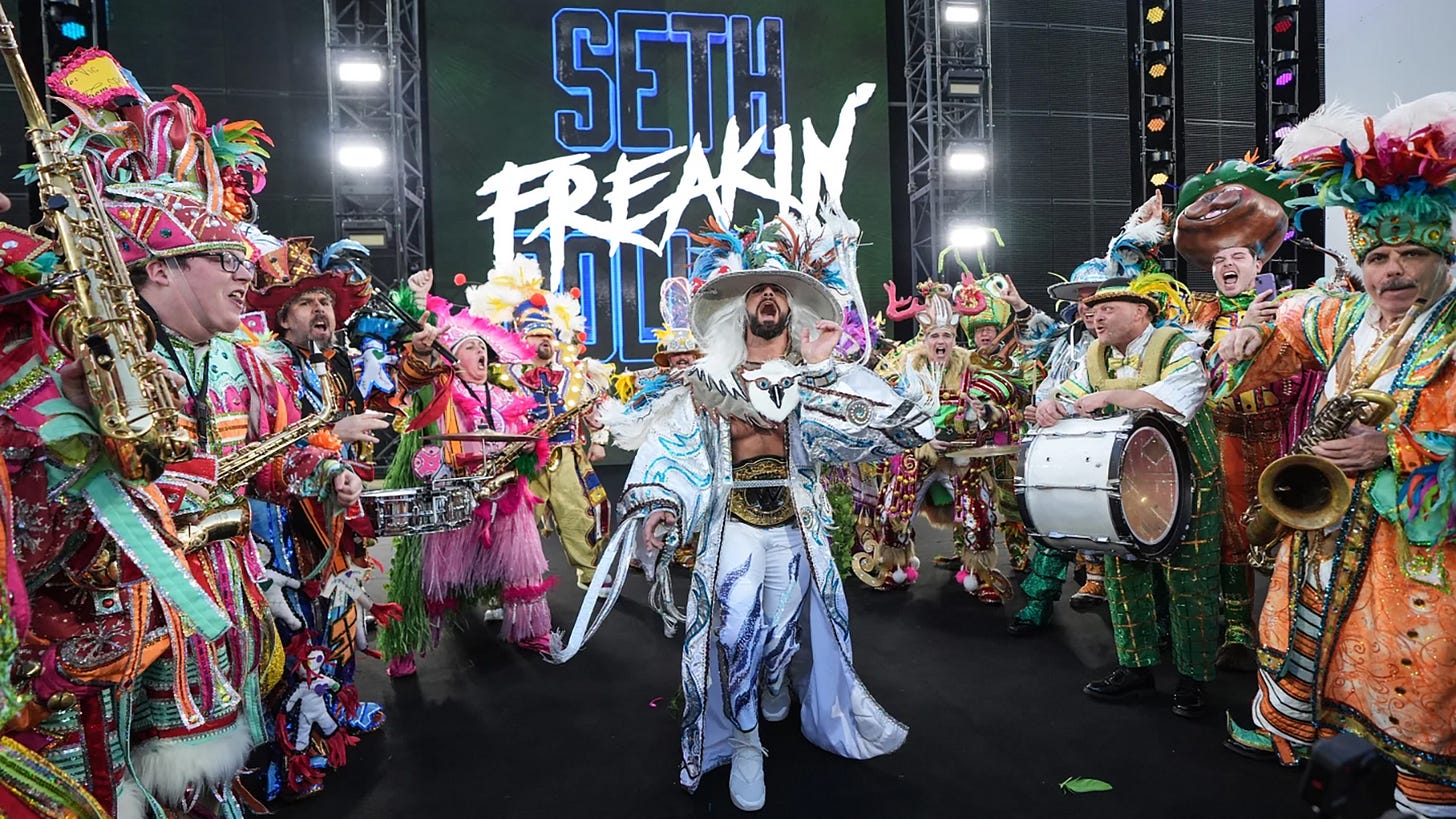
Everything we saw—all of it—was contrived weeks ago by large, white men with big bellies wearing business suits and ties, meeting in conference rooms in the Titan Towers in Stamford, Connecticut.
They’re just doing their jobs, working for TKO Group Holdings, a publicly traded company that you can buy stock in right now on the New York Stock Exchange next to Kraft/Heinz and Starbucks.
It’s so fake it makes you feel a bit like Alice in Wonderland. You wonder: “Is any of this real?”
No, none of it is real. The only thing that’s real is that the performers are actual, living human beings. That’s it. Everything else is an illusion.
Triple H admitted as much right after WrestleMania was over: during the postgame analysis, WWE shared a clip from an interview on Twitter/X where he said the following:
“Then, to do what he did with Cody Rhodes and getting to the end of this chapter. He’s going to go on a whole new story now that is going to blow people’s minds. He’s going to take it to a whole other level. Can’t tell you how much respect I have for Roman Reigns.”
I saw this and thought: “Wait, what?”
“He’s going to go on a whole new story now?”
Triple H is telling everybody that Roman Reigns’ “storyline” is going to change?
The man is essentially Walt Disney, writing a new character arc for Snow White. That’s how fake all of this is.
Yet, when I looked at the public’s responses to the post, they were overwhelmingly positive, with followers excitedly latching onto his promise that this new story was “going to blow people’s minds.”
This is so weird: they’re not even hiding it. The fakery is and always has been out in plain sight.
At this point, pro wrestling seems like a magic show in Las Vegas. Except it’s not one of those legendary Penn & Teller magic shows at The Rio that you’d want to spend hundreds of dollars to see: it’s more like a really crappy magician doing a bad magic act on the sidewalk for a few bucks.
You’re walking down the street, and you see a guy in a ridiculous top hat and red and black cape. He’s standing on a makeshift stage right off the sidewalk. A sign says “Magic show: $3.00”
You stop and think: “Okay, I’ll give him a few minutes of my time,” drop three dollars into the jar, and go through the curtains. He begins talking to the small crowd that has assembled.
“I am now going to pull a rabbit out of my hat!”
Everybody watches as he takes a live, white rabbit out from behind his back, stuffs it into the hat, and—even though everybody’s seen the whole thing and they’re all aware of the rabbit they just saw—he still decides to go through the motions anyway, and pulls the rabbit back out of the hat.
“Abracadabra!” he says.
Did he perform a magic trick? Kind of… but in the worst possible way.
Yet, through it all, some people in the audience (not you, obviously) still pretend to be surprised as though they didn’t see it coming even when they literally did, just a few seconds earlier.
Maybe they don’t criticize or boo the lousy magician because they don’t want him to feel bad. Or perhaps it’s because you’re in Las Vegas, and it’s all so delightfully campy that maybe this is part of the act, and you give it a pass.
“Hey, it was just $3.00, and how often am I in Las Vegas?” you think.
This is what WrestleMania was to me.
For example, the “behind the scenes” footage where the cameraman shoots “candid” scenes of the backstage banter was some of the worst I’ve ever seen and heard. It was far, far worse than the soap operas my angry babysitter used to watch when I was a child.
At least in a soap opera, when we see a jilted wife confront her husband’s adulterous lover, we have compassion for her. We believe that if this were real life, this poor wife would actually act this harshly and coldly toward the woman who is destroying her life.
But there isn’t a bone in my body that can even pretend to believe that rich millionaire bodybuilders on a live televised event could ever talk to each other like that and mean it.
It’s just so… fantastical and overblown that I can’t even suspend my disbelief long enough to “enjoy the show.”
All the rivalries are manufactured, and WWE actively creates fake tension between their performers, trying to make the audience believe (or pretend to believe) that there’s actually bad blood between the players.
It’s so weird: in WrestleMania, you don’t have the Hatfields and McCoys; you have the “faces” and the “heels.” And instead of shotguns and blood feuds, it’s manufactured fury and rage that could only exist on a stage made of tightly stretched canvas under the blinding lights of the Philadelphia Eagles’ home stadium with more than 70,000 paying attendees as the video cameras roll.
Despite the extreme melodrama, I’m sure they all go out for drinks at night when it’s over, and they laugh all the way to the bank as they pretend to nurse their pretend wounds and injuries.
I just can’t get into the whole storyline and loyalty thing.
You know how football fans will sometimes say things like, “I’m a Patriots fan. I hate the Denver Broncos?” This has always puzzled me. “Hate” is an incredibly strong term. How can you possibly “hate” a sports team?
Sometimes I want to ask people who say this: “Why? What did the Denver Broncos ever do to you?” I don’t ask questions like that, of course, because there’s no good answer to it.
Most people who “hate” the Denver Broncos have never had any interaction with them at all.
They’ve never seen the Broncos play in a live game.
They’ve never even been to Denver!
What a weird societal phenomenon we have as humans. I know this is popular: loving one pop culture figure and hating another, but I just can’t get into it myself.
WWE is like cotton candy: it’s 97% fluff and 3% substance.
This analogy was all I could think of the whole time.
Do you know how long a freestyle wrestling match—a real wrestling match—lasts?
I’ll tell you: six minutes. There are two periods of three minutes each.
Six minutes: that’s it!
It’s all very fast. And the actual wrestling itself is very fast, too. If you’ve ever seen a real wrestling match, you might recall just how explosively, fanatically fast those guys move on the mat. They don’t spend a single second grandstanding, staring their opponent down, or—God forbid—shouting into a microphone: “I challenge you” or “You’re going down.”
No. In real wrestling, the match starts, and it’s a 100% energetic burst until you pin your opponent or you run out the clock and the referee blows his whistle.
In stark contrast, WWE spends about a half hour per match letting the performers peacock, talk to the crowd, play music, or run in chaotic directions all over the arena, inside and outside the ring, finding things like tables, chairs, ladders and even kendo sticks to beat their opponents with.
This was exceptionally annoying to me.
In addition, it was made worse by the fact that we sat through two entire hours of pregame commentary before the actual “event” started. All I could think the whole time was, “Is this ever going to start? Is anybody ever going to say ‘action,’ so we can actually watch this thing?”
All the dialogue by all the people was all hyperbole all the time.
Have you ever met someone who is obsessed with something that really isn’t that great, but they just can’t stop telling you just how incredible it is?
Kanye West once said that a music video by Beyonce was “the greatest of all time.” I hate this pointless level of rhetoric. In the past few years, I’ve heard people use extreme language about all kinds of things.
“So and So is the worst president of all time,” or “Such and Such is the best movie of all time.”
Really? Spare me.
Rolling Stone magazine does this kind of crap all the time with lists like:
500 Greatest Songs of All Time
500 Greatest Albums of All Time
100 Greatest Musical Artists of All Time
This stuff is all clickbait. You really think Elvis, the Rolling Stones, and U2 are the greatest of all time? Really?
I like Bono, but you’re saying he’s better than Beethoven, Wagner, Verdi, Brahms, Gesualdo, Gershwin, Britten, Prokofiev, Williams, Glass, Bernstein, Handel, Vivaldi, Hayden, and many, many others throughout history since Hildegard of Bingen gave us our first written music almost 1,000 years ago? And that’s just Western music. We haven’t even considered Eastern music.
I’ll be rude and ask the obvious: do Kanye, or Beyonce, or Rolling Stone, for that matter, even know who any of those people were?
This kind of extreme exaggeration is just mind-numbingly stupid to me.
Throughout all of WrestleMania, from the pregame to the main event and in the postgame, almost all the words used by anybody who was ever given a microphone were bombastic and overblown to the point of absurdity.
“The greatest of all time” was stated so many times I lost count.
“The best in history” was another favorite phrase.
“He’s in excruciating pain,” one commentator said when a wrestler was clearly pretending to be hurt (but obviously wasn’t… at least not excruciatingly).
They love their invented titles, too.
“Undisputed World Champion” was thrown about so many times I couldn’t understand how they could have so many “World Champions” all at the same time.
Isn’t the point of calling someone a “Champion” to say they’re better than everyone else? There can only be one, right?
No matter, though, “Undisputed World Champion” is small potatoes! We also learned about the “Undisputed Intercontinental Champion,” and if that weren’t enough, there’s even an “Undisputed GLOBAL Champion!”
Wow, we’re all winners here!
Hearing nonstop embellishment to this extent for so many hours was tiresome and became almost surreal, and it made all words start to lose their meaning.
Another thing I wanted to ask was: “Champion of what?”
It’s not at all like being an Olympian or world record holder. Being a “GLOBAL CHAMPION in WWE” means nothing. If you doubt this, I dare you to put any one of those “champions” in an actual boxing ring or octagon with someone like Tyson Fury or Conor MacGregor. See how that ends up.
I just had to roll my eyes at one point when one man was smacked by another man in the ring, and the announcer said—I kid you not: “This is not a movie; this is real life.”
Oy vey…
I tried not to laugh, but I couldn’t not laugh. I was busting at the seams. My son was laughing, too. It was all too much.
WrestleMania is, essentially, a movie being made in real time. It has producers, directors, actors, a laugh track, applause cards, a soundtrack, cameras, staging, lighting, costuming, and everything else.
It is not real life. It is the furthest thing from real life.
The vocabulary was too hard for me to keep up with.
Aside from everything I’ve stated so far, there were myriad words and phrases I had never heard before, and my head nearly spun as I tried to keep up with them all:
angles
storylines
faces
heels
tweeners
kayfabe
heat
mark
stables
factions
These, and more, were so overwhelming and numerous that I eventually stopped asking my son to tell me what they all meant.
But even he confused me at times. When the Samoan tag team “The Usos” came into the ring, my son asked me:
“Hey Dad, are you ‘yeet?’ or ‘no yeet?’”
I just stared at him in mild amusement, unable to comprehend what language he was speaking. I said, “I’m yeet,” for the sheer fun of it since I couldn’t figure out what it meant (and it didn’t matter anyway).
He then started pumping his fist in the air, saying: “Me too! Yeet! Yeet! Yeet!”
I don’t get it, but that’s okay.
It’s all about money.
The whole thing is, clearly, all about money. That’s not necessarily a bad thing per se, but it is annoying to someone like me who tends to be a purist and wants people to care about a thing for the thing itself.
For example, Olympic athletes don’t get paid to compete (at least not in America). They do it ostensibly for the love of the sport. Yes, they’ll find a way to make money, but no, they do not do it for the money. They can’t.
There’s WAY more money in other things like brand deals and sponsorships, but you can only get to that point if you are a serious athlete who is the best in the world. You have to do that first, and then the money can come later.
When I lived in Colorado Springs near the US Olympic Training Center, I met plenty of Olympians who were working as coffee shop baristas while they trained night and day for their Olympic aspirations. They were not getting rich off their sport.
And that’s a HUGE difference. WWE doesn’t care about anything at all other than one question: “What will make us money?”
That’s why “WrestleMania” has zero “wrestling” in it.
They don’t care about wrestling.
They only care about money.
That’s why Dwayne “The Rock” Johnson and even John Cena “came out of retirement” at the last minute during WrestleMania to punch and kick the other wrestlers on the stage, then take a swig from a water bottle and spit it into each others’ faces.
That’s why they brought in the rapper Snoop Dogg as a featured commentator and why they snuck in NFL star Jason Kelce at the last second as a sort of “masked hero.”
That’s why I had to pay $11.99 to subscribe to Peacock Premium in order to watch this grand spectacle, and, if what my son tells me is true, that’s why front-row seats to the live show in Philadelphia cost up to $13,000/each.
That’s why they released WWE 2K24 for the Xbox a few weeks ago, which I bought for my son for $59.49 because I love him, even though I just bought him WWE 2K23 a few months ago.
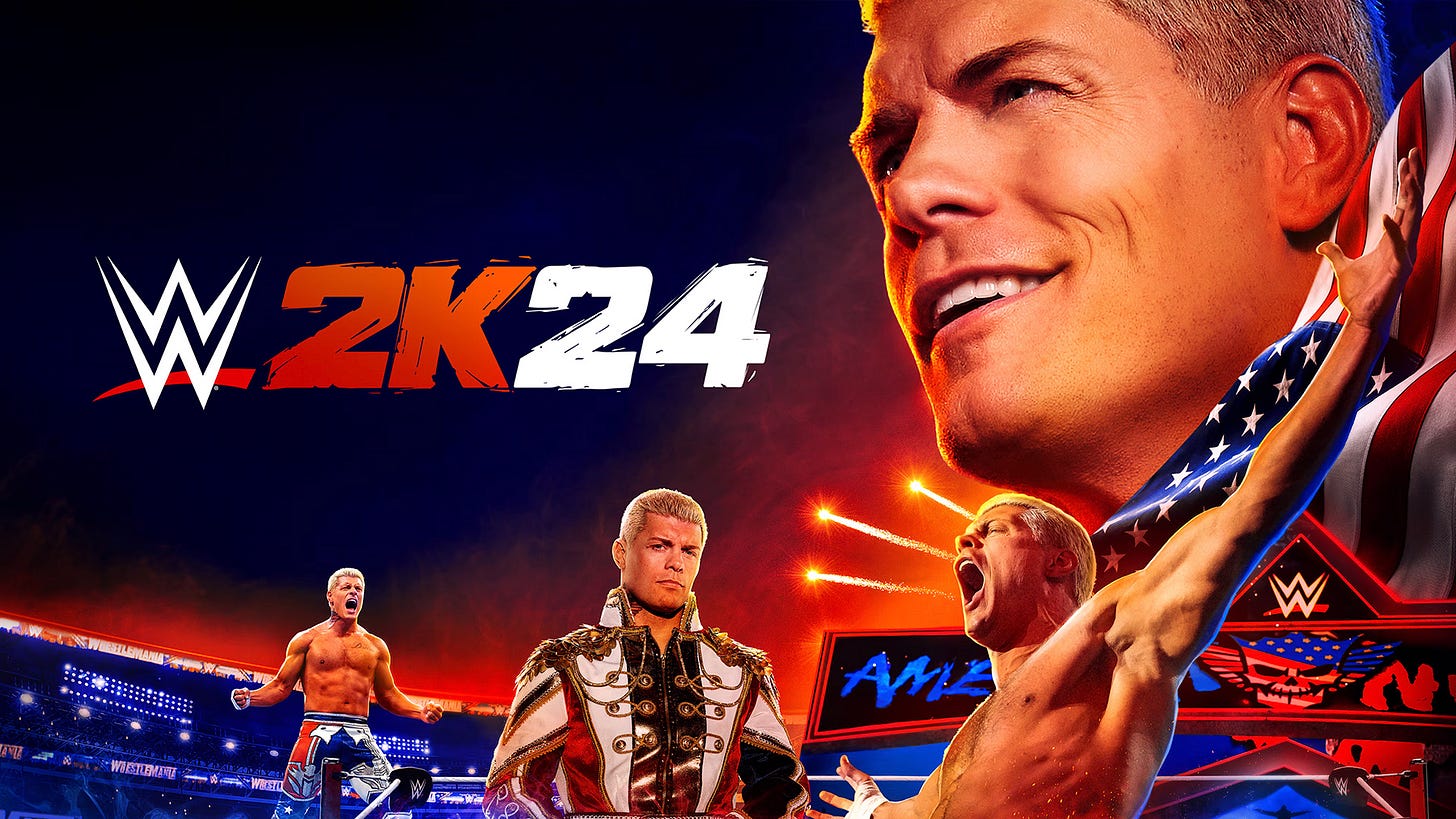
It’s also why WWE 2K24 features Cody Rhodes prominently on the front cover and—SURPRISE!—he also just happened to be the final champion of WrestleMania… after his stars-and-stripes tattooed face has been front and center on the new game, selling millions of copies to little boys across the world for the past month.
Could they let anybody other than that man win?
It’s not all bad, though. It’s fine.
In conclusion, I don’t really hate WWE anymore. I’ve come to peace with it.
I don’t hate the “wrestlers” anymore (even though they’re not real wrestlers, and I’d say this to their faces). I also don’t even hate the middle school bully Wade anymore.
Pro wrestling just… isn’t my thing. It has all the pomp and circumstance of the Super Bowl but none of the foundational excellence that makes it impressive.
I won’t tell my son not to watch it, but I don’t think I’ll watch it with him again… unless he wants to watch WrestleMania again next year, in which case, we’ll do it again because, as I’ve said, I love my son.
My conclusion is that WrestleMania is the most American thing I’ve ever seen in my entire life. I’m embarrassed by it, but it’s not all bad. It’s like being part of an extended family. Families are embarrassing sometimes. But they’re also okay and even fun to be a part of.
My son is part of my family, and he likes WrestleMania, so, embarrassing as it is, WWE is part of my family. And that’s okay.





